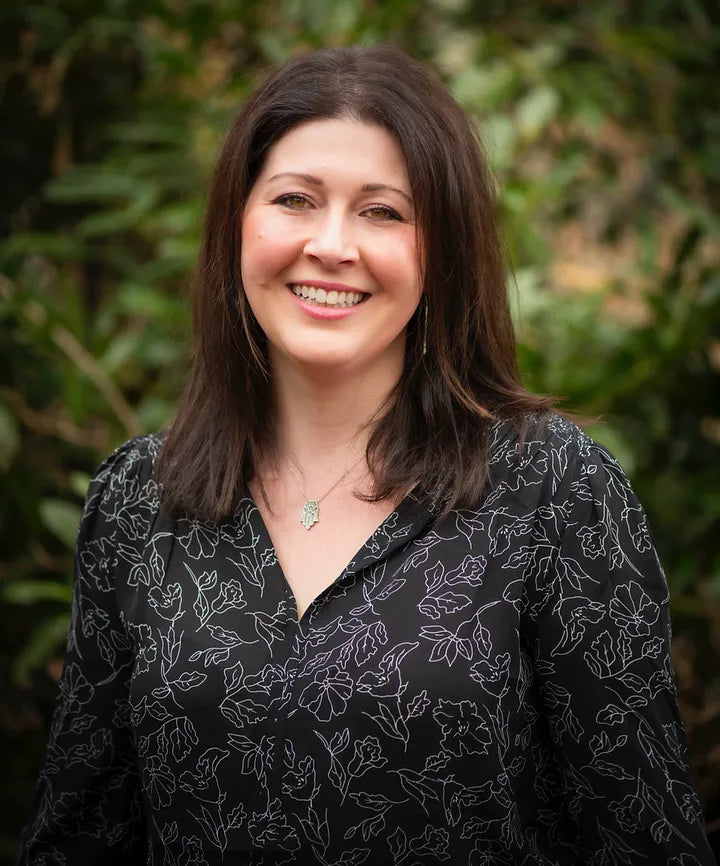Trust your instincts: It is easy to second guess yourself especially when you start off. You might feel like you aren’t doing enough or don’t know enough. If something feels off it probably is. Trust the process and trust yourself.
Today, more than ever, wellness is at the forefront of societal discussions. From mental health to physical well-being, women are making significant strides in bringing about change, introducing innovative solutions, and setting new standards. Despite facing unique challenges, they break barriers, inspire communities, and are reshaping the very definition of health and wellness. In this series called women in wellness we are talking to women doctors, nurses, nutritionists, therapists, fitness trainers, researchers, health experts, coaches, and other wellness professionals to share their stories and insights. As a part of this series, we had the pleasure of interviewing Natalie Jambazian.
Natalie Jambazian, an esteemed Licensed Marriage and Family Therapist and Self-Love Coach based in Los Angeles, CA, specializes in women’s mental health and relationships, with a focus on Narcissistic abuse recovery, trauma, anger, and grief. She not only provides therapeutic services such as individual and family therapy, play therapy, anger management coaching, cognitive behavioral therapy, mindfulness practices, and narrative therapy but also leads weekly support groups for survivors of Narcissistic relationships. Through these groups, she empowers individuals to grow beyond the clutches of abuse, emphasizing self-love, self-respect, and the journey to overcome childhood trauma.
Thank you so much for joining us in this interview series! Our readers would love to “get to know you” better. Can you share your “backstory” with us?
Ibegan my career in the fast-paced and glamorous world of the entertainment industry. For years, I worked behind the scenes as a personal assistant to a celebrity. While the excitement and glitz of the industry were enticing, exciting, and a journey filled with so much experience, I soon realized that something was missing in my life. Amidst the dazzling lights and high-profile events, I recognized the mental and emotional undertakings that many individuals experience within the industry. It was here that I began to feel a deep sense of empathy for the struggles that often go unnoticed behind the scenes.
Intrigued by the human psyche and motivated by my desire to make a meaningful difference, I made the decision to transition my career and return back to college life to obtain my Bachelor’s degree and then follow with my Master’s degree in psychology. I pursued extensive training, earning my license as a therapist, and embarked on a new journey dedicated to helping individuals navigate the complex landscape of their emotional and psychological well-being.
My background in the entertainment industry provided me a valuable perspective, by understanding the unique pressures and challenges our world faced. Today, as a licensed therapist working in the industry for over seven years I have built a private practice in Sherman Oaks, California specializing in Narcissistic abuse recovery. I bring to my practice not only my professional training but also a personal journey that has shaped my understanding of and commitment to recovery. Like many, I too have experienced the effects of Narcissistic relationships. This experience ignited my passion to help others by empowering them to heal, rebuild, and reclaim their lives.
Can you share the most interesting story that happened to you since you started your career? What were the main lessons or takeaways from that story?
The most interesting story that happened to me when I first started as an associate mental health therapist was when I was facilitating an anger management group. I was working with clients who were court-ordered and came across a client who threatened to hurt me. This was because I let the client know in private without other clients present that there were inappropriate comments that were being made by that individual in the group and I reminded the client to be respectful of others in the group. The individual did not like that and threatened me. Afterward, I called the police and reported the incident. I have never experienced anything like that before. I did not expect that behavior and did not know what to do next. I was surprisingly calm and called my supervisor after the client left and she walked me through it. After speaking to the police I decided not to press charges. I learned that my safety is important and to never panic in circumstances like that because panicking can be worse. It was a life-changing experience as it helped me become more hypervigilant of myself and my surroundings.
It has been said that our mistakes can be our greatest teachers. Can you share a story about a mistake you made when you were first starting? Can you tell us what lesson you learned from that?
The biggest mistake or challenge I would say when I first started out as a mental health therapist was not being able to set boundaries with clients. I am a recovering people-pleaser and needed to be liked not only by my friends and family but by clients as well. I felt like I needed clients’ approval to feel as though I was a good therapist. I would be available for clients at any given time and that set an expectation for clients to contact me outside of work hours. Of course, for emergency purposes, I was making myself available 24/7. There were times when clients would expect immediate responses (not emergency-related) and text me about anything that was going on with their lives. I accommodated requests, often at the expense of my own well-being. This wasn’t a good example I was setting for myself or my clients who also needed to learn to set boundaries for themselves. Over time, I began to experience burnout and found it challenging to provide effective therapy. Therapists are also mirrors to their clients, reflecting back their thoughts, emotions, and experiences.
The lesson I learned from these experiences was the importance of establishing and maintaining clear boundaries with clients ahead of time and setting realistic expectations for myself and my clients. I learned clear communication is essential to foster a safe and secure environment. This lesson emphasizes the importance of maintaining professional boundaries for both the therapist’s well-being and the client’s benefit and highlights the lesson learned about the significance of professional ethics in therapy.
Let’s jump to our main focus. When it comes to health and wellness, how is the work you are doing helping to make a bigger impact in the world?
My work as a mental health therapist has a profound impact on the world by nurturing the well-being and mental health needs of many individuals suffering from depression, anxiety, PTSD, trauma, and many other mental health concerns. Through guidance and support, I empower clients to navigate life’s challenges, heal emotional childhood wounds, and develop resilience. In doing so, I help improve not only the lives of my clients but also contribute to building a more emotionally intelligent, empathetic, and compassionate society. By addressing mental health issues, reducing stigma, and promoting self-awareness and self-care, my work creates a positive rippling effect by fostering healthier relationships, stronger communities, and a world where emotional well-being is valued and prioritized. My role as a therapist is pivotal in shaping a better and more caring and empathetic world for all.

Can you share your top five “lifestyle tweaks” that you believe will help support people’s journey towards better wellbeing? Please give an example or story for each.
1. Learning stress-reduction coping mechanisms like deep breathing, yoga, progressive muscle relaxation, or engaging in hobbies can help individuals manage stress effectively, which in turn enhances well-being. One example I use on clients is the 5–4–3–2–1 method, where I ask clients to describe 5 things they see in the room, 4 things they hear, 3 things they smell, 2 things they taste, and 1 thing they touch. This helps ground individuals in the present moment.
2. Limited screen time: We live in a generation where social media is the prime focus of our daily lives. Although it has its advantages, it also has disadvantages. Reducing screen time, especially on digital devices before bedtime, can lead to better sleep quality and reduce anxiety.
3. Incorporating regular exercise into one’s routine has numerous benefits for mental and physical health. Exercise can reduce stress, boost mood, improve sleep, and increase wellness.
4. Spending time outdoors and connecting with nature can have a calming and revitalizing effect. Whether it’s walking, hiking, or simply sitting in a park or garden reading a book, nature can promote overall mental and psychological well-being.
5. Traveling also is a great way to foster a greater understanding of the world and its diversity and culture, by promoting empathy, self-awareness, and open-mindedness.
If you could start a movement that would bring the most amount of wellness to the most amount of people, what would that be?
The movement I would create to bring the most amount of wellness is emotional education. It would be to prioritize emotional intelligence and educate people from a young age on how to recognize, understand, use, and manage their emotions effectively. So many mental health issues start from a young age and if we could alter that at its core the world would be a better place.
What are your “5 Things I Wish Someone Told Me Before I Started” and why?
- The business side matters even as a mental health therapist. Beyond clinical skills, understanding the business aspect of running a mental health practice is essential. This includes managing finances, marketing, and dealing with administrative tasks.
- Self-care is non-negotiable: As mental health therapists, we put a lot of our emotional energy into helping others, which can be emotionally taxing at times for us. Prioritizing self-care and boundaries and seeking your own mental health therapist is crucial.
- Don’t be afraid to take risks: Trying something new without the fear of failure. Engaging in decisions and uncertain outcomes can leave a positive impact. I have learned risk-taking is a fundamental aspect of personal and professional growth.
- Trust your instincts: It is easy to second guess yourself especially when you start off. You might feel like you aren’t doing enough or don’t know enough. If something feels off it probably is. Trust the process and trust yourself.
- Find your niche and passion: It’s more fulfilling to pursue a career that you’re passionate about. While financial stability is crucial, it’s equally important to find a career that you genuinely enjoy and aligns with your interests and values.
Mental health is a big topic at the moment. Why is it so dear to you, and why?
Mental health is dear and near to my heart because I too have struggled with anxiety and depression, and also witnessed others experiencing the impact it has. For this reason and more, I am passionate about breaking the stigma and increasing awareness to support others in their mental health journey. Healthy mental states foster positive relationships, increase productivity and success, and are linked to overall positive well-being. By openly discussing mental health, I encourage people to seek help when needed, rather than suffer in silence due to fear or shame. Developing good mental health promotes self-awareness and self-acceptance. Seeing a therapist myself all these years has helped me so much physically, mentally, and psychologically. Mental health is important because it affects every facet of our daily lives. By recognizing its significance and promoting its well-being, we can create a healthier, happier, and more fulfilling world for ourselves and future generations.
What is the best way for our readers to further follow your work online?
They can follow me on my social media platforms and website.
https://www.tiktok.com/@selflove_society
https://www.instagram.com/selflove__society/
https://www.shermanoakstherapy.com
Thank you for these fantastic insights! We wish you continued success and good health.
About the Interviewer: Wanda Malhotra is a wellness entrepreneur, lifestyle journalist, and the CEO of Crunchy Mama Box, a mission-driven platform promoting conscious living. CMB empowers individuals with educational resources and vetted products to help them make informed choices. Passionate about social causes like environmental preservation and animal welfare, Wanda writes about clean beauty, wellness, nutrition, social impact and sustainability, simplifying wellness with curated resources. Join Wanda and the Crunchy Mama Box community in embracing a healthier, more sustainable lifestyle at CrunchyMamaBox.com.




